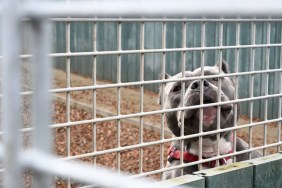With the political season in full swing, you may be wondering where the presidential hopefuls stack up on issues of animal welfare, which is something yet to come up during the Republican debates. At first glance, the choice seems simple: There are the Obamas: their doting daughters, a First Lady who says she wants to be reincarnated as Bo, the family Portuguese Water Dog, and a President who takes his beloved dog shopping. Then there is the Republican frontrunner, Mitt Romney, still dogged by the 30-year-old tale-gone-viral of Seamus, their Irish Setter, who was crated and strapped to the top of the family station wagon for a 12-hour road trip to Canada. Peta called the incident, “abusive.”
But looks aren’t everything. Earlier this month, the Humane Society of the United States (HSUS) gave the Obama Administration a disappointing C- for what it calls “a subpar performance” in 2011 on animal welfare issues (view report card here). This is the lowest rating the Obama Administration has received from HSUS, the largest welfare organization in the country, in its three-year tenure. And here’s why:
According to Wayne Pacelle, the Humane Society’s President and CEO, “we are most disappointed in backtracking the Administration has done on issues related to wolves, predator control, exotic snakes, horse slaughter and the treatment of downed animals,” he wrote to his members, urging them to contact the President and tell him to prioritize animal welfare policies in 2012.”
The Administration, for example, has pledged to regulate puppy mills—currently selling puppies on the Internet without regulation—but has yet to fix the problem. Said Pacelle: “Despite campaign promises that he’d be strong on humane issues, the President has failed to pull together a coherent animal welfare strategy or to deliver any kind of message to our community of 20,000 animal protection organizations and millions of animal-loving Americans throughout the country.”
Still, the devil we know, may be better than the devil that we don’t. Michael Markarian, the president of the Humane Society Legislative Fund, (HSLF), an organization that lobbies to elect humane-minded candidates, is not all that impressed with the Republicans still standing: His group has consistently given Ron Paul low marks on animal issues in Congress—he earned a 10 per cent (out of 100) on the “Humane Scorecard” for the 108th Congress, a 14 percent in the 109th Congress, a zero in the 110th Congress, and a 7 percent in the 111th Congress.
Newt Gingrich earned a 21 percent on the “Humane Scorecard” for the 103rd Congress. While Gingrich voted to allow sport hunting in the Mojave National Preserve, and allow foreign aid dollars to be used to promote the trophy hunting of elephants “Gingrich is, so far, the only presidential candidate who has actively talked about the importance of the human-animal bond on the campaign trial,” said Markarian, who added that Gingrich launched a web site called “Pets with Newt,” and, enjoys visiting zoos wherever he goes.
When Gingrich referenced the Seamus story in a South Carolina television ad (“Imagine what Obama would do with a Candidate like that?” the Speaker said), a floodgate of negative media fell again on Mitt Romney, who was greeted in South Carolina by a group called, Dogs Against Romney (www.dogsagainstromney.com). They sell t-shirts expressing their message: “Mitt is Mean.” As governor of Massachusetts (2003 to 2007) “Romney did not distinguish himself on animal issues,” said Markarian although, he signed a number of animal protection bills into law, including measures to strengthen animal cruelty laws—something his critics say may have helped Seamus.
The candidate who may be next to drop out, Rick Santorum, has the best record on animal protection, earning a 60 percent on the “Humane Scorecard” for the 108th Congress, and an 80 percent for the 109th Congress.” The “Humane Scorecard” is a vehicle for the HSLF to track the performance of federal lawmakers on animal protection issues. To see how your legislator scores, you can visit the final version of the 2011 Humane Scorecard.









